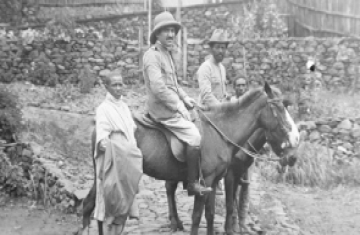 Above: Not that many people outside the Ethiopian Jewish
community knew who Jacques Faitlovitch was. (Moti Milrod)
Above: Not that many people outside the Ethiopian Jewish
community knew who Jacques Faitlovitch was. (Moti Milrod)
Haaretz.com
By Ofer Aderet
Published: May 20, 2011
An odd sculpture recently appeared on the Tel Aviv University campus, following a complex, transcontinental, logistical operation. It was designed in London, assembled in Italy and shipped by sea to Israel. The artwork consists of metal pipes emerging upward from the ground, splitting, and winding around two palm trees. “This expresses continuity and departure,” said the sculpture’s designer, Israeli-born architect Ron Arad, in a phone call from London.
The sculpture is a memorial to Ethiopian Jews who left their homes between 1977 and 1985 for the exhausting, traumatic journey to Israel. The trek took them from Ethiopia to Sudan, and across mountains, deserts, rivers and forests; they faced hunger, thirst, illness, harassment and arrest before winding up in refugee camps…The statue was commissioned and financed by Michael Benabou, a French-Jewish businessman and a member of the French Friends of Tel Aviv University, which provides scholarships to Ethiopian-Israeli students. Two years ago he decided it was time to dedicate a memorial to these students’ community. “It is a tribute to the operation that brought them to Israel, commemorates their suffering, and expresses hope for their future,” he said by phone from Paris…The relationship between the Jews of France and Ethiopia began a century ago, with one man who devoted his life to the latter community. The new sculpture stands opposite Tel Aviv University’s central library, where a small, crowded room on the second floor stores the archives of that man, researcher Dr. Jacques Faitlovitch, who died in 1955.

























